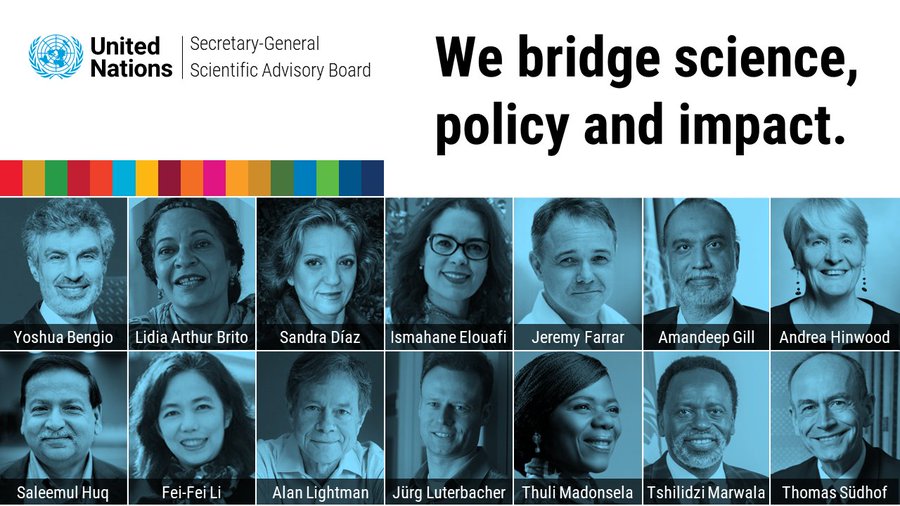
eg whos on spaceship earth (MIT 1979) with UN leader Guterres this month
Guterres
- Professor Fei-Fei Li, Sequoia Professor of Computer Science, Stanford University; Denning Family Co-Director, Stanford Institute for Human-Centered AI, Stanford University https://twitter.com/drfeifei?lang=en
- Professor Yoshua Bengio, A.M. Turing Award, Scientific Director of Mila — Quebec AI Institute, Full Professor, Department of Computer Science and Operations Research, Université de Montréal
- Professor Sandra Díaz, Senior Principal Investigator CONICET and Professor of Ecology Universidad Nacional de Córdoba, Argentina
- Professor Saleemul Huq, Director International Centre for Climate Change and Development, Independent University Bangladesh
- Professor Alan Lightman, Professor of the Practice of the Humanities, Massachusetts Institute of Technology
- Professor Thuli Madonsela, Professor of Law, Stellenbosch University
- Professor Thomas C. Südhof, Nobel Laureate, Professor, Department of Molecular and Cellular Physiology, Stanford University School of Medicine
United Nations Members:
- Chief Scientists from the Food and Agriculture Organization (FAO), United Nations Environment Programme (UNEP), United Nations Educational, Scientific and Cultural Organization (UNESCO), World Health Organization (WHO), and World Meteorological Organization (WMO)
- Secretary-General’s Envoy on Technology Amandeep Gill
- Rector, United Nations University https://twitter.com/tmarwala
In deeper discussion of VeryGoodAI (happy to share rough notes used by players of AIgames.solar chris.macrae@yahoo.co.uk) Bard has mapped 20 institutes in stanford (converging exponentially since stanford rebranded the valley HAI (Human Centric HAI) and LLM s not augmented reality have become the gateways to web3;
that can help Guterres bring vision to urgent sdgsai.com from around the world
these include Li Ka Shing's from his multiple university branches originally out of Hong Kong
Mrs Zuckenberg (Priscilla Chan) who with Melinda Gates and Fei-Fei Li and have very synergetic interests in health, child development and personalised digital ai which LLMs can distribute through Pichai's 1000 Language model
Taiwan and Brooklyn;s Own Ms Tsai Lu
Deep Mind's Lila Ibrahim
Jennifer Doudna, Nobel Laureate in Chemistry, CRISPR pioneer, and coauthor of A Crack in Creation
Stanford Hoover Institute's Condoleeza Rice
Have we missed out anyone at tehse levels of humanity intel - please rsvp chris.macrae@yahoo.co.uk
play AIGames.solar
Official account / Office of Secretary-General's Envoy on Technology. Envoy: USG Amandeep Singh Gill #DigitalCooperation #GlobalDigitalCompactNew Yorkun.org/techenvoyJoined July 2018





Duties and Responsibilities
ReplyDeleteBuilding on the work of the High-Level Panel on Digital Cooperation and consultations of multi-stakeholder roundtable groups, the United Nations Secretary-General issued a Roadmap for Digital Cooperation (A/74/821) which addresses how the international community can better harness the opportunities presented by digital technologies while addressing their challenges. The Secretary-General's report "Our Common Agenda" issued in September 2021 prioritizes the digital space and the need to "protect the online space and strengthen its governance". It also proposes a Global Digital Compact to be developed through a multistakeholder track.
OSET leads the implementation of the Secretary-General's vision on digital cooperation by working closely with various UN entities and multi-stakeholder groups, facilitating dialogue to accelerate global digital cooperation, seizing on the opportunities that are presented by technology – while mitigating the risks – so that progress towards achieving the Goals by 2030 can be made collectively, as well as carrying out other related duties and responsibilities assigned by the Secretary-General, including follow up actions from the report "Our Common Agenda".
The job opening is located in the Office of the Secretary-General's Envoy on Technology (OSET), Department of Operational Support, United Nations, New York. The Consultant will report to the Envoy on Technology, through the Senior Programme Officer. The duties and responsibilities of the consultant include:
• Providing support to the Secretary-General’s High-level Advisory Body on AI, including:
- analysing the AI governance landscape
- arranging meetings of the HLAB
- supporting consultations
- drafting reports
• Perform other duties, as required.
Bard Says: both John von Neumann and Alan Turing referred to neural networks in their work.
ReplyDeleteJohn von Neumann was a Hungarian-American mathematician and physicist who is considered to be one of the founders of computer science. He wrote a paper in 1958 titled "The Computer and the Brain" in which he discussed the similarities between computers and the human brain. In this paper, he proposed that neural networks could be used to create artificial intelligence.
Alan Turing was an English mathematician and computer scientist who is considered to be the father of theoretical computer science and artificial intelligence. He wrote a paper in 1950 titled "Computing Machinery and Intelligence" in which he proposed the Turing test, which is a test of a machine's ability to exhibit intelligent behavior equivalent to, or indistinguishable from, that of a human. In this paper, he also discussed the possibility of creating artificial neural networks.
However, it is important to note that neither von Neumann nor Turing actually built a neural network. The first neural network was built in 1958 by Frank Rosenblatt, who called his neural network the perceptron.